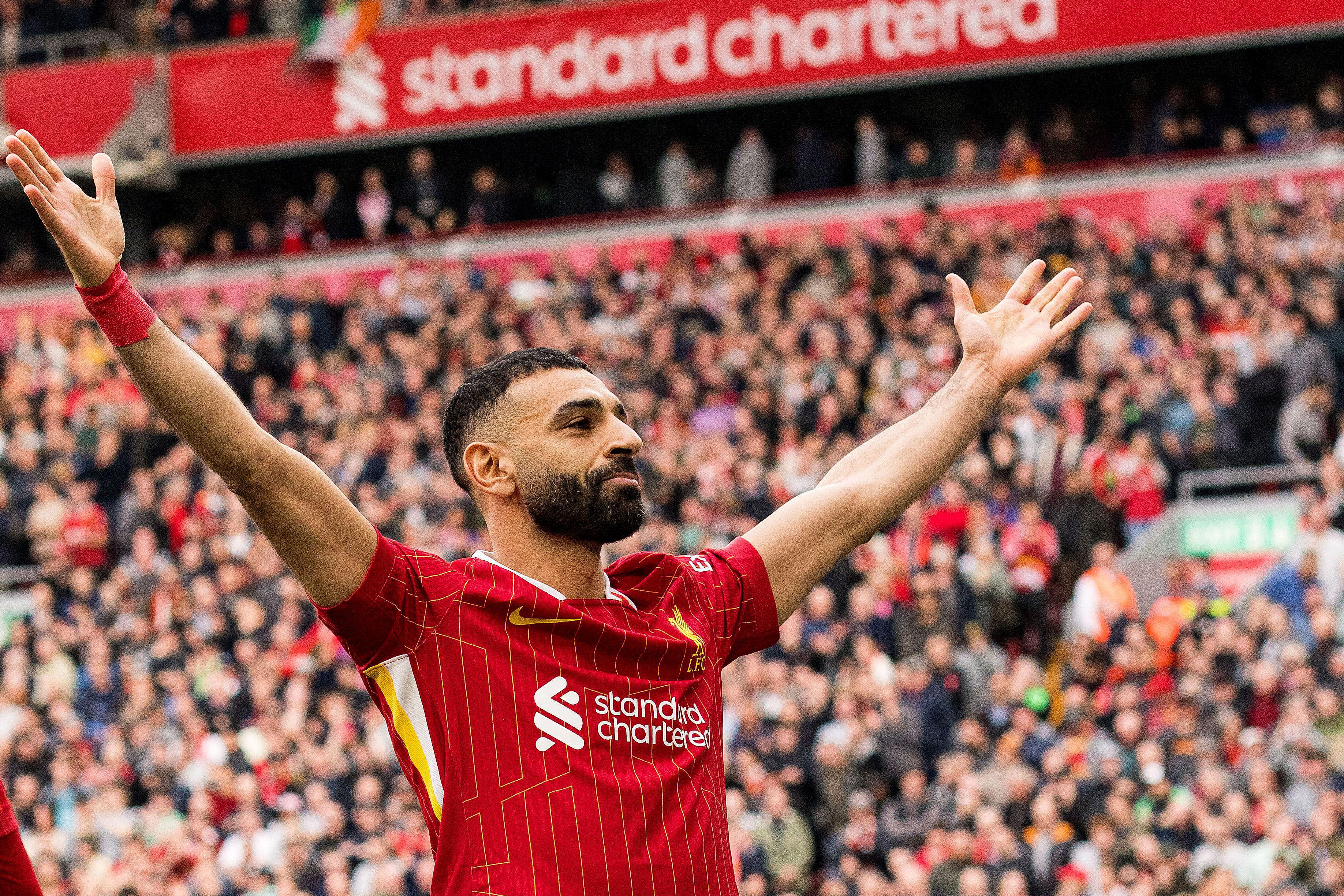Ranked! The 50 most hated people in football
Scumbag owners, filthy players, dire pundits – join FourFourTwo in our countdown of the most reviled individuals in the game
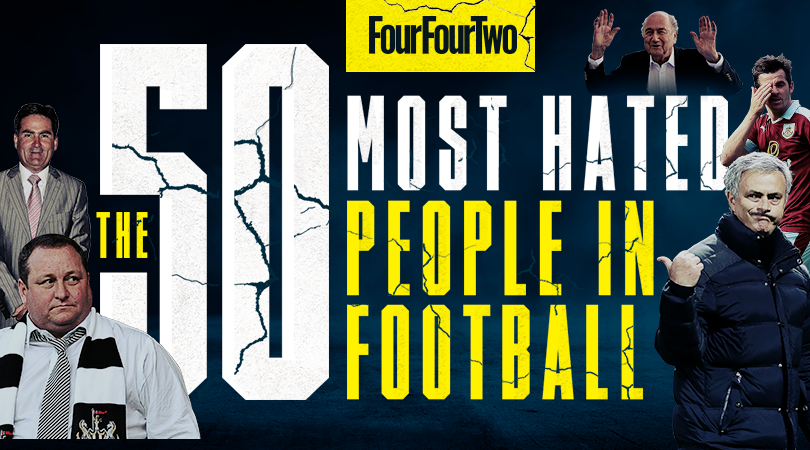
Mixed in with the cheats, chancers and chairmen that make up this list, there's a big dollop of pure, unadulterated envy. Yep, while every entry in our countdown of 50 most hated people in football have drawn major dislike for a variety of reasons, some of them are also loved in equal measure.
This isn’t a list of people we here at FFT personally hate - although some of the people here are definitely off our Christmas card list - but rather who stir up opprobrium in the game.
So what we’re saying is: don’t blame us if your favourite icon whose face you have tattooed on your thigh is here (although it would be a pretty strange person to have Mike Dean inked on their leg). We’re just trying to hold up a mirror to the football world.
That said, if we’ve put anyone here who shouldn’t be present - or if we’ve missed out someone widely reviled - do let us know (nicely) @FourFourTwo.
50-41 • 40-31 • 30-21 • 20-11 • 10-1
50. Sergio Ramos
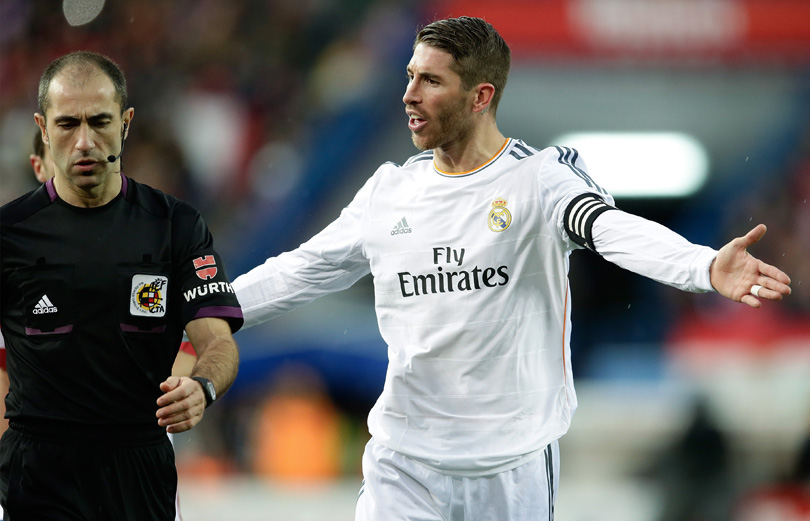
Open a dictionary at the entry for ‘pantomime villain’, and the definition might simply be a picture of Sergio Ramos, perhaps waving an imaginary yellow card at a browbeaten referee. Ramos holds the record for the joint-most sendings off of any La Liga player ever, but he’s a strange kind of hard man in that he is impossible to take seriously.
Get FourFourTwo Newsletter
The best features, fun and footballing quizzes, straight to your inbox every week.
Rather than a chilling defensive gatekeeper, the Real Madrid defender’s persona is more defined by a kind of larger-than-life recklessness; a shameless supervillain. You could say that Ramos – good looking, cartoonishly ludicrous, lacking any self-awareness and amassing trophies on behalf of a super-rich juggernaut – is the defining footballer of the modern age.
Words: Alex Hess
49. Alan Pardew
His public personality straddles the line between smug and sleazy – it’s probably encapsulated by the nauseating touchline dance when Crystal Palace went ahead in the 2016 FA Cup Final, which did achieve the impressive feat of getting neutrals to back Manchester United.
There’s a thin veneer of respectability, but like a dry-lipped Bruce Banner, Pardew also has a nasty streak that occasionally bursts out - from calling Manuel Pellegrini a "f***ng old c***" to head-butting an opposing player on the touchline.
Despite a middling managerial career, he carries a sense of superiority that’s best evidenced by what West Ham fans call the ‘king story’.
Words: Amit Kawala
48. Robbie Savage
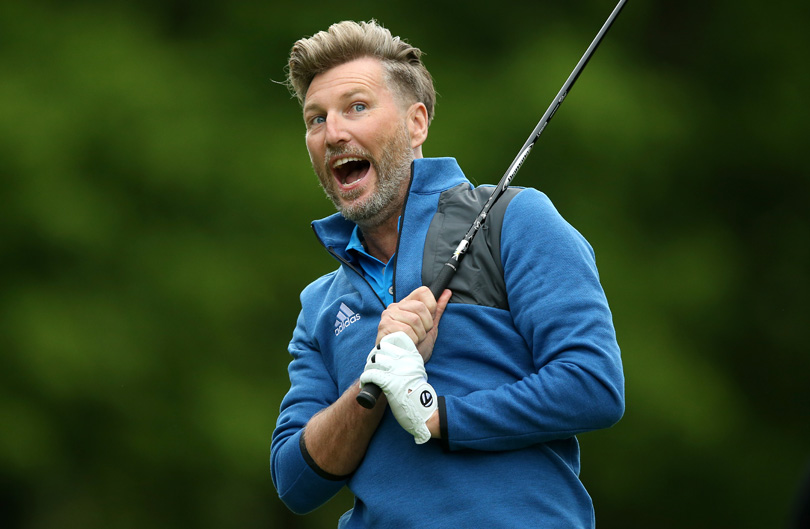
A media career which mimics who he was as a player. Robbie Savage, the combative, provocative player became ‘Sav’, the opinion-on-absolutely-everything pundit.
To give Savage his dues, he was really just an early exponent of something which many of his contemporaries have recently caught up with - i.e. he who shouts loudest and most antagonistically, wins. We’re looking at you, Chris Sutton.
He’s also been very successful and until quite recently, straddled nearly half a dozen radio and television channels, appearing in all sorts of different formats. The irritating talking head who proves the old maxim: it’s not what you say, it’s how you say it.
Words: Seb Stafford-Bloor
47. Tony Pulis
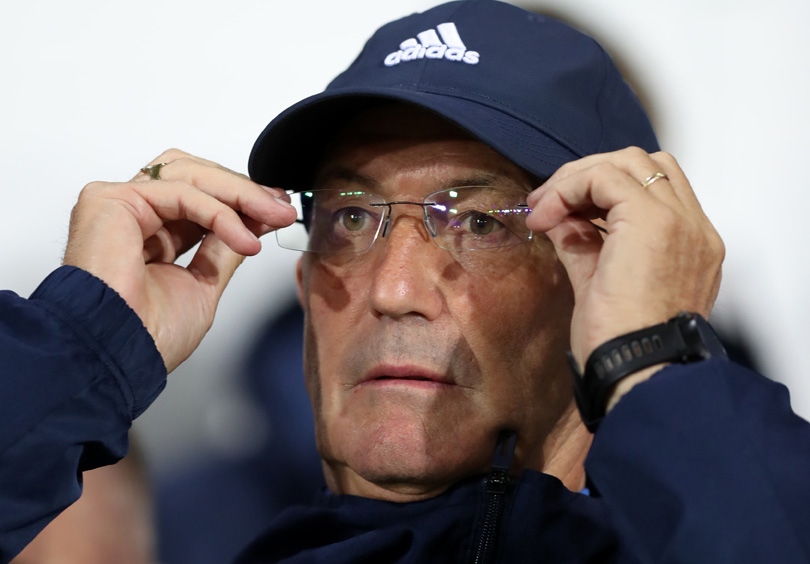
Until recently, it had been largely opposition fans that resented Tony Pulis's signature – and wholly unapologetic – sit-and-stifle blueprint. Although it’s increasingly now fans of the clubs he manages too. Just as sure as Wales' foremost excitement-extinguisher will always have his admirers among those who prize mid-table security, he will always face seething opprobrium from the more aesthetically minded among his spectatorship.
Pulis has been scorned by many a snookered manager in his time but none more frequently or indignantly than Arsene Wenger, who has variously labelled Pulis's team "cowards", "horrendous" and practitioners of "more rugby than football".
Also allegedly head-butted his own striker while wearing nothing but a scowl once – an image to give us all nightmares.
Words: Alex Hess
46. Pepe
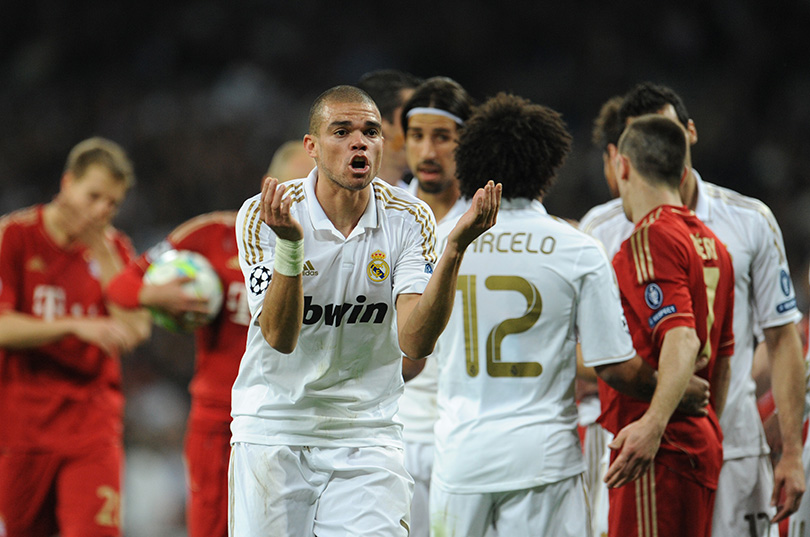
Portugal’s master of the dark arts is – to English eyes at least – everything that’s wrong with football. He has all the attributes to be a legendary defender – pace, bravery, strength and intelligence – and, after a decade at Real Madrid, the trophy cabinet to match. But it’s the manner in which he’s used his talents that attracts the ire.
Like his long-time defensive partner Ramos, Pepe a is dirty, dastardly and downright infuriating player – the kind who will pull the shirt off your back when he’s defending a corner, and then collapse like a house of cards if you give him the same treatment at the other end.
Words: Amit Kawala
45. Alan Green
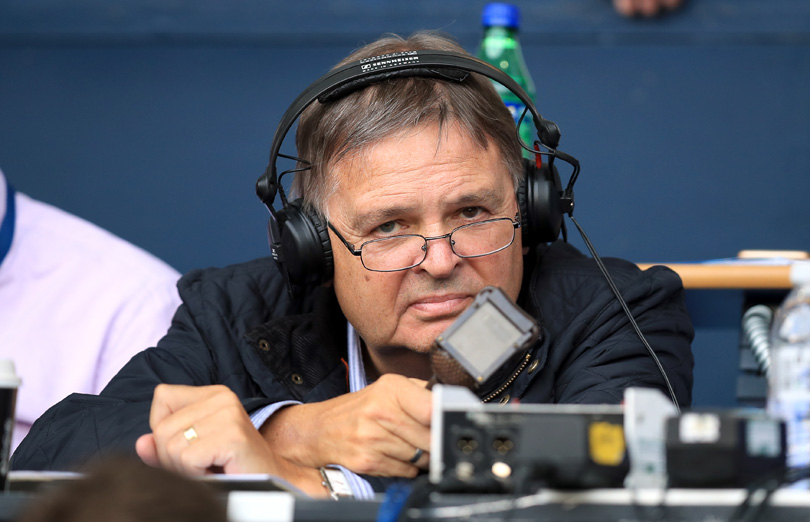
Poor Alan Green. He’s disliked for being everything that a football commentator is supposed to be.
Today’s equivalent is a slave to the sound bite and, more often than not, gratingly optimistic at every turn. In contrast, Green is gloriously dour; every game he covered - and continues to cover - presents an opportunity for a good ol’ moan.
To a particular type of unstable, fundamentalist fan he was prone to moments of bias, but his real crime was likely that his presence - his voice, his tone, his demeanour - made any game sound like an attritional battle in the mud. The marmite of British commentary.
Words: Seb Stafford-Bloor
44. Stan Kroenke
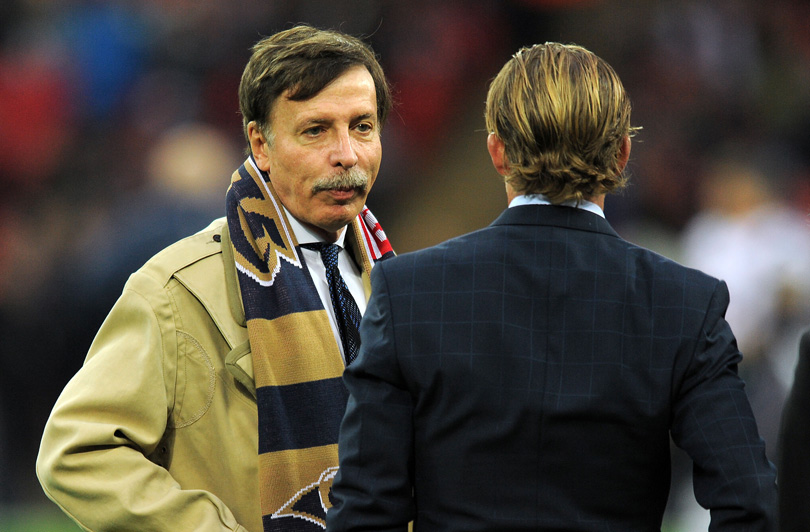
A man whose bank balance soars thanks to a team that meekly treads water is never going to be worshipped by that club's fans - and so it has proved with the American sports tycoon, for whom the tide of public opinion appears to have been fiercely turning over recent months.
“We don’t want his sort,” was the response of Arsenal's former chairman Peter Hill-Wood when Kroenke first showed up on the scene. That was in 2007, when Kroenke began amassing shares for £7,500. A decade on, with the American having invested precisely zero of his own money in a team that had long been drifting towards irrelevance, he was turning down offers of £32,000 per share. Good work if you can get it.
Words: Alex Hess
43. Ben Thatcher
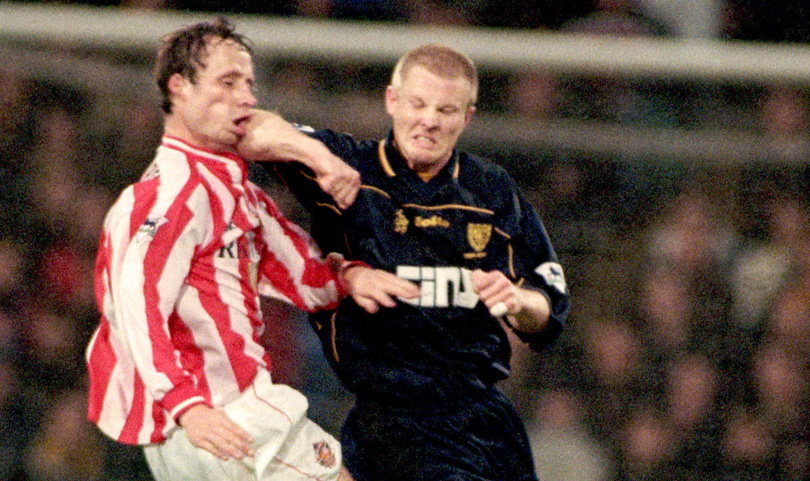
Once is an accident. Twice is coincidence. But unfortunately for a player whose elbowing controversies numbered at least three during a red-and-yellow-flecked 18-year career, thrice is very much a trend.
Thatcher gained notoriety in 2006 when his ostensible attempt to dispossess Pedro Mendes resulted in his forearm bludgeoning the face of his opponent, who was rushed to hospital having suffered a pitchside seizure. The level of brutality was so severe that Greater Manchester police were compelled to launch an investigation – just as Lancashire police had looked into a similar ‘challenge’ during a reserve game that February.
Six years earlier, in his final year at Wimbledon, Thatcher had dished out the same treatment to Sunderland’s Nicky Summerbee – a moment that persuaded the onlooking Kevin Keegan against selecting him, as planned, for his upcoming England squad. Thatcher would go on to represent Wales, despite having played for England at U21 level (four appearances, one red card).
Words: Alex Hess
42. Neil Warnock
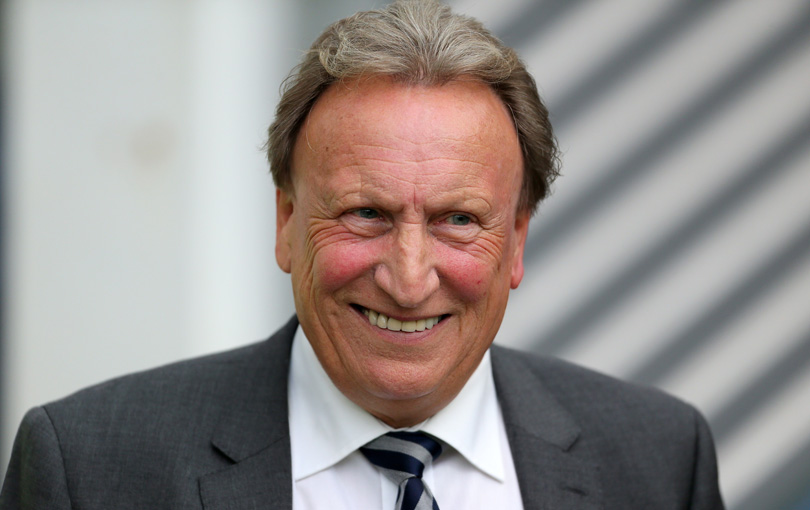
To catalogue his fall-outs would take more than the allotted space here, but suffice to say the aptly anagrammed managerial veteran has his fair share of enemies. The sheer range of this roll call – from the widely loathed (El Hadji Diouf, Stephen Hunt) to the inoffensive (Gareth Southgate) to the downright bizarre (Sean Bean) – is testament to Warnock's status as a man who could not so much start a fight in a phonebox as inspire a Royal Rumble in one... before complaining about the outcome in the press.
His position as a protagonist in the fabled Battle of Bramall Lane (three red cards, two 22-man melees, one abandoned game) makes for an apt top spot on Colin Wanker’s greatest hits compilation.
Words: Alex Hess
41. Sergio Busquets
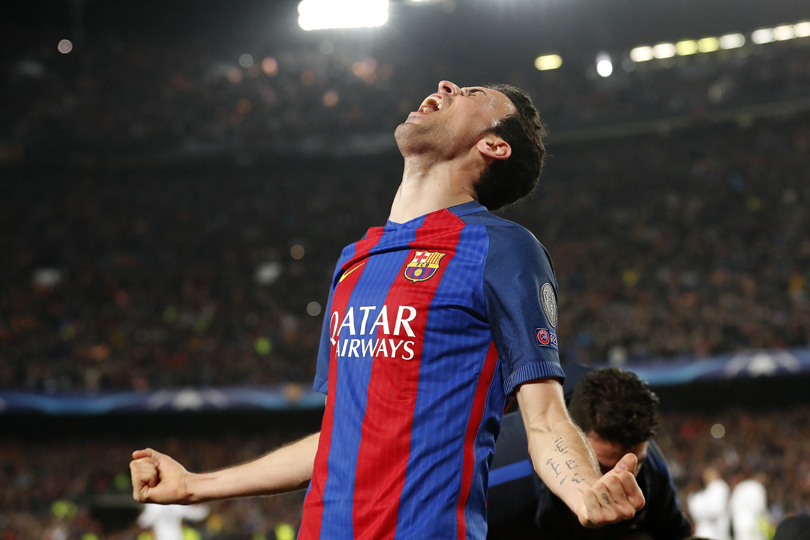
The iron fist inside the velvet glove. Busquets is a fabulous player, that’s not in dispute - he might even be underrated. But he lacks the sheen of many of his team-mates and the perception of him as the physicality behind Barcelona’s grace, hopelessly reductive though it is, makes him the hateable face of his club.
Few dislike Messi and only a philistine would object to Iniesta, so what are you left with? Who provided the outlet for the world’s seething jealousy? The big, awkward looking guy in the middle, of course, with his fondness for theatrics and dalliances with the dark arts.
Words: Seb Stafford-Bloor
50-41 • 40-31 • 30-21 • 20-11 • 10-1
40. Steve Evans
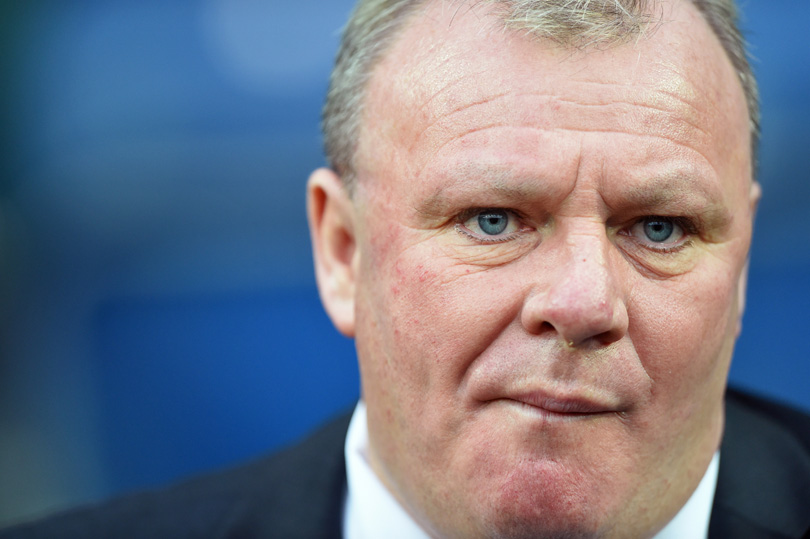
For the casual, Premier League-focused fan, Steve Evans just seems like your average, run-of-the-mill Football League manager – overweight, and somehow both red-faced and pasty simultaneously.
Yet Evans has a reputation as one of the most hated managers in lower-league football, from spells at Boston, Crawley, Rotherham, Leeds and now Mansfield.
Although touchline disasters and cosying up to Massimo Cellino at Leeds are on his rap sheet, the hatred for Evans originally stems from his conviction for tax fraud (actual evasion, not just good old avoision): during his time at Boston, player bonuses and wages were disguised as expenses to help the Lincolnshire club win promotion to the Football League.
Words: Amit Kawala
39. Vincent Tan
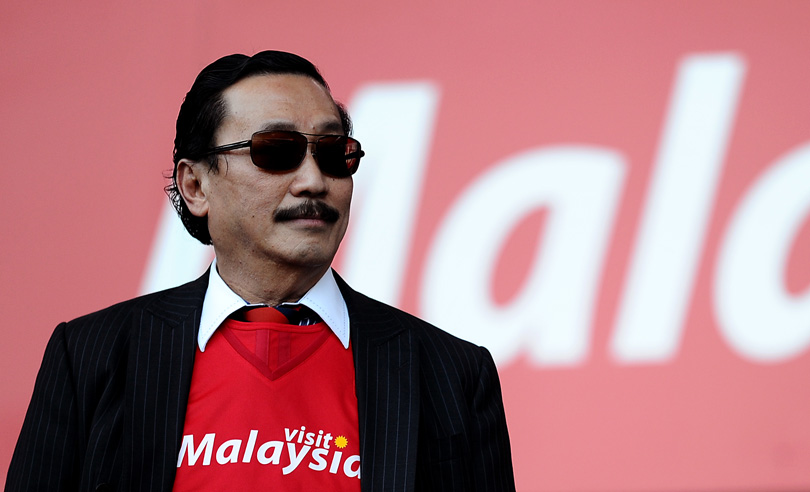
In our eyes, his biggest crime is wearing a football shirt over a normal shirt (and under a suit jacket). Yet Cardiff City fans have bigger gripes. When Malaysian billionaire Tan took over the Welsh club in 2010, they’d just missed out on Premier League promotion.
Although his investment helped the Bluebirds attain that prize, it came at a cost. Despite overwhelming opposition from fans, Tan pushed through a rebrand from the City’s traditional blue to a red hue favoured in Asia. The change lasted just three years, but Tan’s total disregard for a club’s tradition won him no friends in south Wales.
Words: Amit Kawala
38. Vinnie Jones
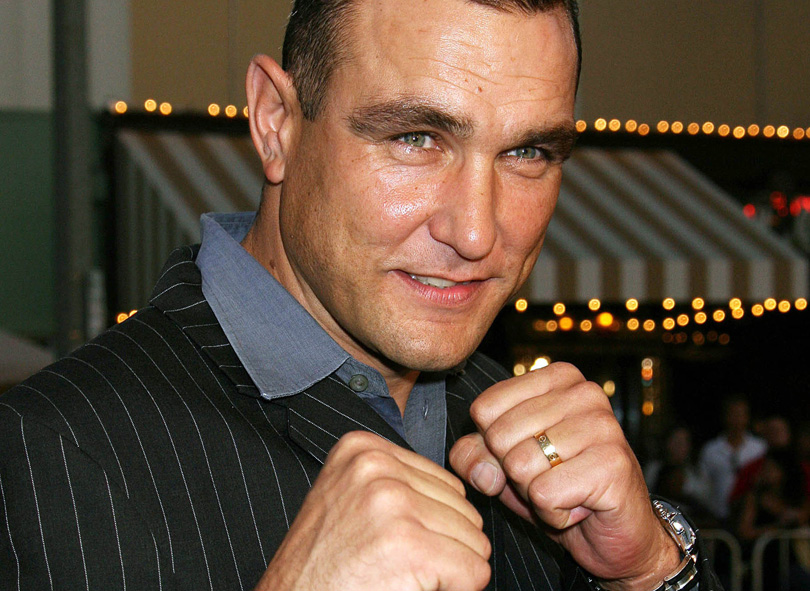
In the 1980s and 1990s, Jones was the tough-tackling, ball-grabbing face of Wimbledon’s Crazy Gang, and a self-confessed ‘Soccer Hard Man’ who was fined by the FA for appearing in a video of that name.
He was sent off a troubling 12 times during his career, and typifies the overblown machismo of ‘Danny Dyer football’ – an aesthetic that’s carried over seamlessly into his Hollywood career (he turned down a role in Snakes on a Plane, which is a good enough reason for hate in itself).
It would be interesting to drop Crazy Gang era Vinnie Jones into a flowing game of modern Premier League football and see how long he lasted before being dragged off the pitch by stewards with Theo Walcott’s blood all over his face.
Words: Amit Kawala
37. Roberto Rojas
In September 1989, a promising Chile side were losing to Brazil in a crucial qualifier, and on the verge of missing out on the World Cup. Then, 65 minutes in, a flare thrown from the stands seemed to hit their goalkeeper Roberto Rojas, who went down bleeding from a head wound. The match was called off, and Brazil’s place seem threatened.
Yet it turned out that viewers had been duped. Rojas the rotter had cut his own head, with a blade hidden in his glove – a plan devised alongside captain Fernando Astengo. The flare hadn’t landed anywhere near him.
“We thought the plan had worked. With all the pressure and Chile wanting so badly to win, I really didn’t think I had done anything wrong at the time,” he said. Rojas was banned from football for life.
Words: Amit Kawala
36. John Fashanu
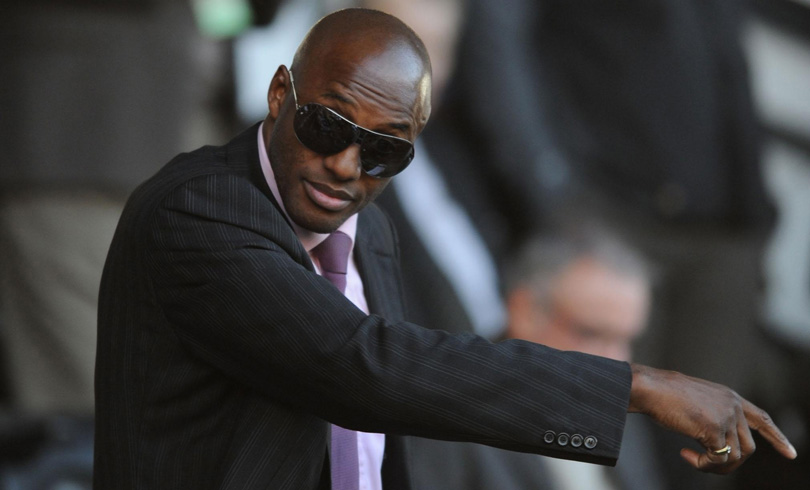
It’s fair to say that Wimbledon’s Crazy Gang, whose piece de resistance FA Cup win against Liverpool came after their captain had threatened to rip off Kenny Dalglish’s ear in the tunnel, did not expend much energy striving for popularity. However, Fash the Bash’s dubious profile is the product of more than just his on-pitch unpleasantries (which in itself included shattering Gary Mabbutt’s eye socket with his elbow).
His involvement alongside Bruce Grobbelaar and Hans Segers in a high-profile match-fixing scandal (all were eventually cleared) muddied his name, but it was his public ostracisation of his brother – the openly gay footballer Justin – which has left the most toxic legacy.
Words: Alex Hess
35. Graham Westley
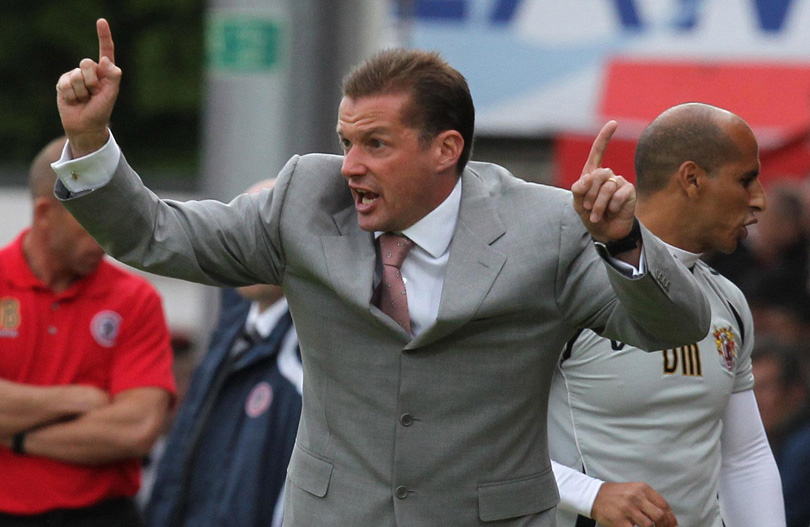
Given the shadow cast by the Premier League, it’s remarkable that Westley – who has never coached above League One – has the reputation that he does. Or maybe it’s telling.
He’s managed 11 clubs in 20 years, including three separate spells at Stevenage, and has evidently always had the capacity to put noses out of joint. Note, for instance, how many times Westley seems to have left clubs in a backdraft of acrimony and how often personal disputes, supporter fallout, or personality clashes seem to have been responsible.
Perhaps Westley can be summed up in one quote, a magical mixture of arrogance and nonsense: “My kids don’t call me Dad,” he once said. “They call me Medal Winner.”
Words: Seb Stafford-Bloor
34. Antonio Rattin
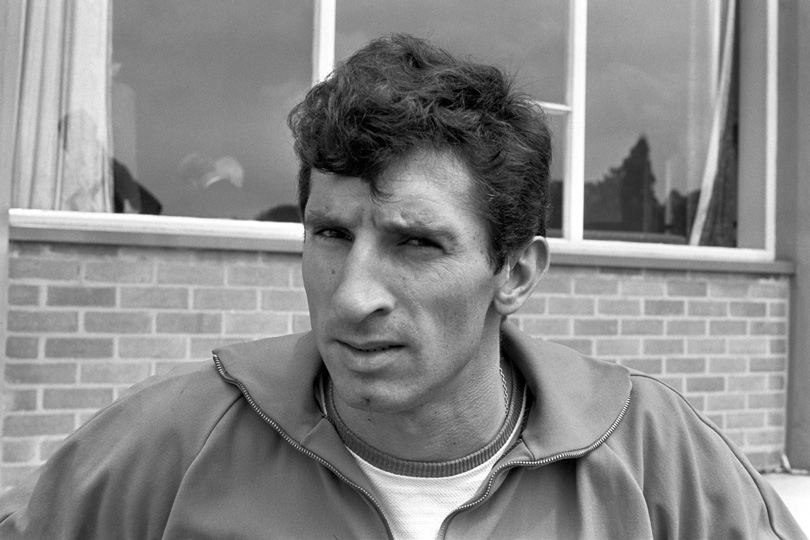
The foul-mouthed Argentina captain during the 1966 World Cup was sent off by the German referee after 35 minutes of their quarter-final against England for “violence of the tongue”. But then, believing the referee to be biased, he refused to leave the field, sat down on the red carpet reserved for royals and (gasp) insulted the Queen.
Eventually, Rattin had to be led from the field by two police officers. It made him football’s top villain of the 1960s on these shores.
Yet in South America, this incident was viewed as an injustice against the Argentines – with fans pointing out that the referee spoke no Spanish, so couldn’t have known what Rattin was saying to him.
Words: Amit Kawala
33. Tim Sherwood
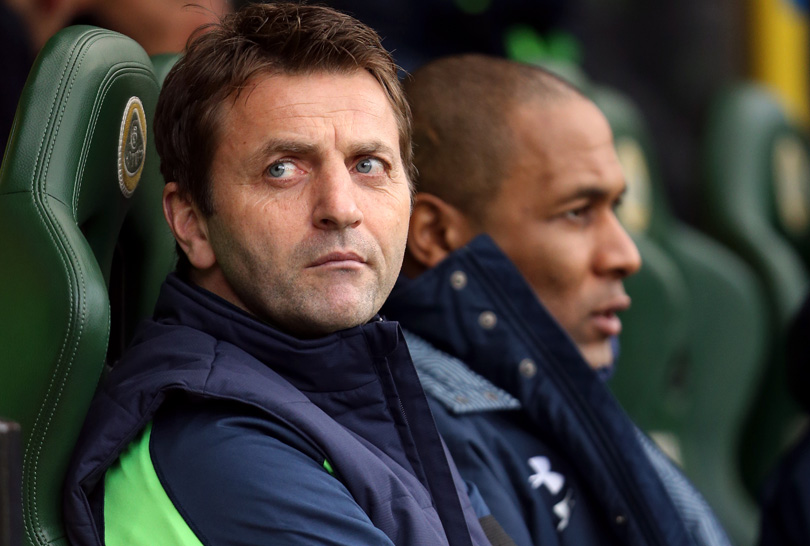
Sherwood’s managerial career started right at the top, and burned hot and bright – like an asteroid smashing into the ground. He joined Tottenham under Harry Redknapp, performed well with the U21s, and was took the senior reins in December 2013 after the departure of Andre Villas-Boas.
It was an abrupt change. From a thoughtful, tactical manager, Spurs were now being steered by a gilet-hurling, chest-thumping manager driven by “passion”. The results weren’t actually that bad, but a spell at Aston Villa ended in relegation and the anger stopped getting results, while his bullish attempts to take credit for Harry Kane come across as a bit desperate. Also, his arms must be really cold.
Words: Amit Kawala
32. Mark van Bommel
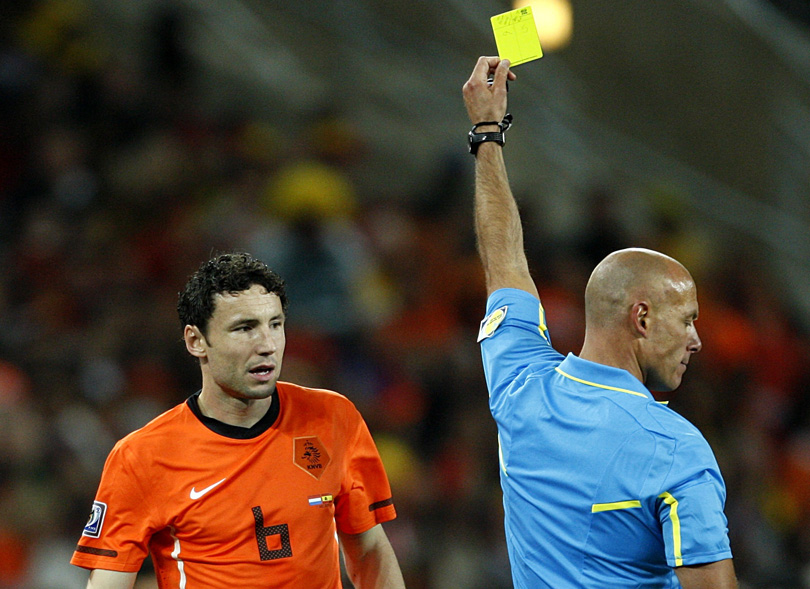
Although the Dutch midfielder’s reputation was crystalised in the 2010 World Cup Final – a one-match campaign to obtain a red card that Howard Webb manfully ignored – Van Bommel’s villainy is really a body of work.
Just as it has become fashionable to refer to rudimentary playing positions by their Italian or Spanish equivalent, it’s a surprise that nobody has coined a phrase for his role. A lover of yellow-cards, a purveyor of tactical fouls (which seemed often – amazingly – to go unpunished). Basterde, perhaps?
Van Bommel was also an awfully good player, which – in that Steffen Effenberg sort of way – somehow made it worse.
Words: Seb Stafford-Bloor
31. Francesco Becchetti
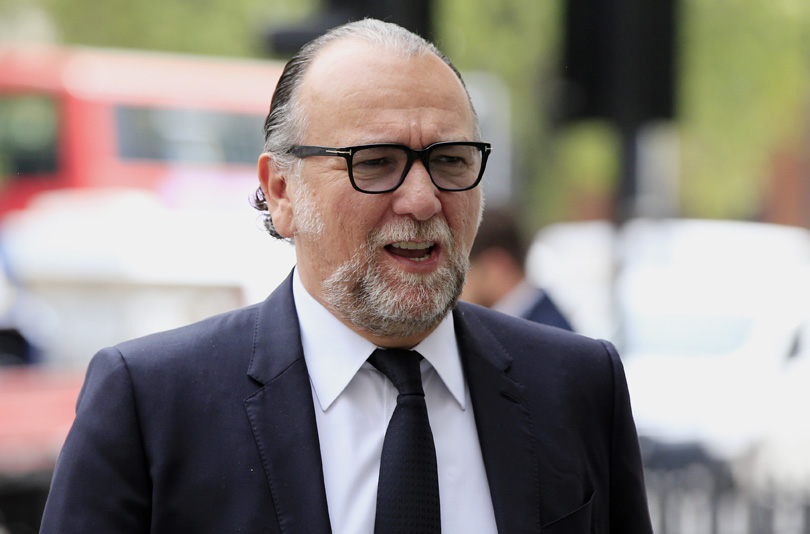
In the summer of 2014, when Francesco Becchetti's waste management consortium took over Leyton Orient, only a penalty shoot-out had denied the club a place in the Championship.
When the Italian left Brisbane Road three years later, Orient were a non-League club for the first time in 112 years, had gone through 10 managers and were on the brink of existential obliteration. After two relegations, one failed reality TV show, one winding-up order from the high court, a money laundering investigation and a six-match ban from his own stadium for kicking the Orient manager, he was finally hounded out.
But the damage – calamitous in scale – was well and truly done. "This is a position from which it can grow," he said upon departing the National League club.
Words: Alex Hess
50-41 • 40-31 • 30-21 • 20-11 • 10-1
30. Alex Ferguson
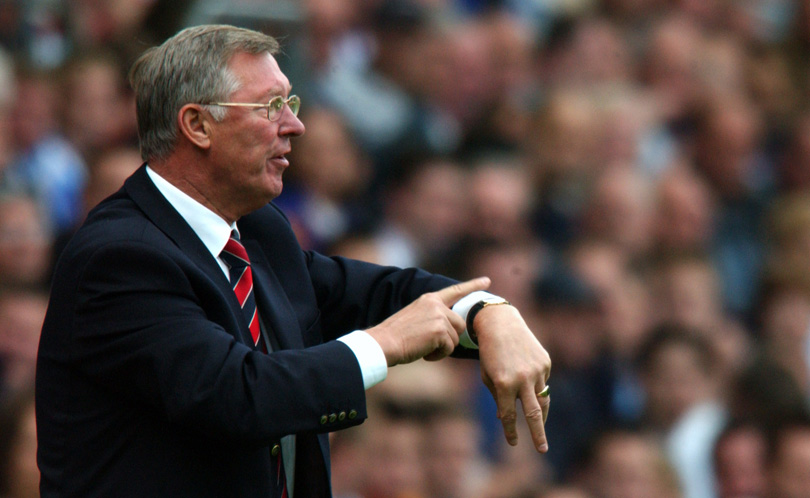
The most successful manager in British football history stands as fairly sound proof that the surest way to foster resentment from all angles is to win everything in sight. But barbarity begins at home, and to that end Ferguson was never shy of going to town on his own players, with Paul Ince, Peter Schmeichel, Jaap Stam, David Beckham, Roy Keane and Wayne Rooney among the United stalwarts who fought losing battles against Old Trafford’s in-house follicle restylist.
Further afield there were journalists (“f***ing idiots”), the Old Trafford crowd (“like a funeral”), Man City (“noisy neighbours”), Newcastle (“a wee club in the north-east”), Italians (“inventors of the smokescreen”), Germans ("typical Germans") and “Real Madrid (“wouldn’t sell that mob a virus”).
Plus, of course, the various stages of his career were characterised as much by managerial feuds – most notably with Kevin Keegan, Arsene Wenger and Rafa Benitez – as they were by teams or trophies.
Words: Alex Hess
29. Mike Dean
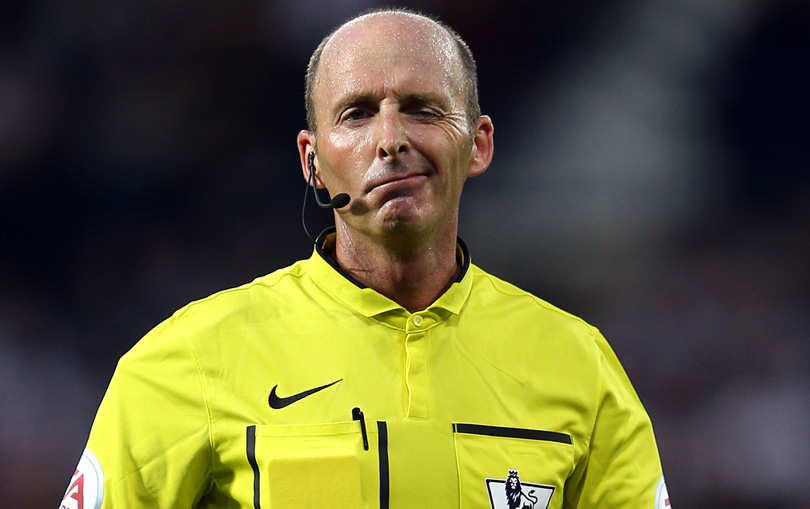
Referees, it’s fair to say, are never on the fast track to public favour. Such is the nature of a job that involves implementing even the most pedantic of rules within a ragingly tribal bloodsport.
But it's the ones who seem to savour every last second of their role of jobsworth-in-chief that, fairly or not, really tend to rile the onlookers.
Mike Dean is one such man: never knowingly under-flourishing a card or downplaying a telling-off, his signature self-congratulatory flamboyance has quickly passed from annoying quirk to full-blown internet sensation.
Words: Alex Hess
28. Joe Kinnear
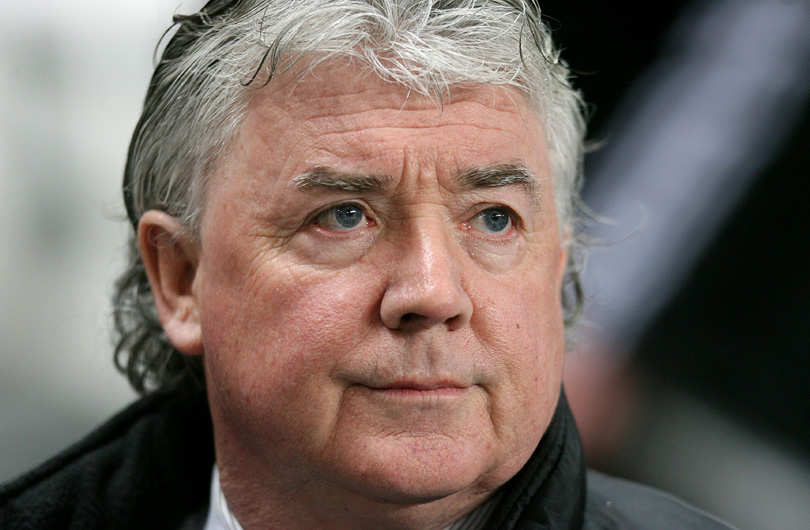
Searching for a low point of Mike Ashley’s time as Newcastle owner is a full-time job, but his dealings with Joe Kinnear sit high on the list. Ex-Wimbledon boss Kinnear was originally appointed as Magpies manager in September 2008 – and was soon letting loose an expletive-filled rant in which he swore 52 times and called the Daily Mirror’s Simon Bird a c**t.
When he was brought back in as director of football in 2013, there was outrage. Fans threatened a boycott as, in a bizarre radio interview, he insulted the intelligence of Newcastle fans and mispronounced the names of several players (Yohan Kebab, anyone?). He failed to make a single permanent signing during his tenure.
Words: Amit Kawala
27. Silvio Berlusconi
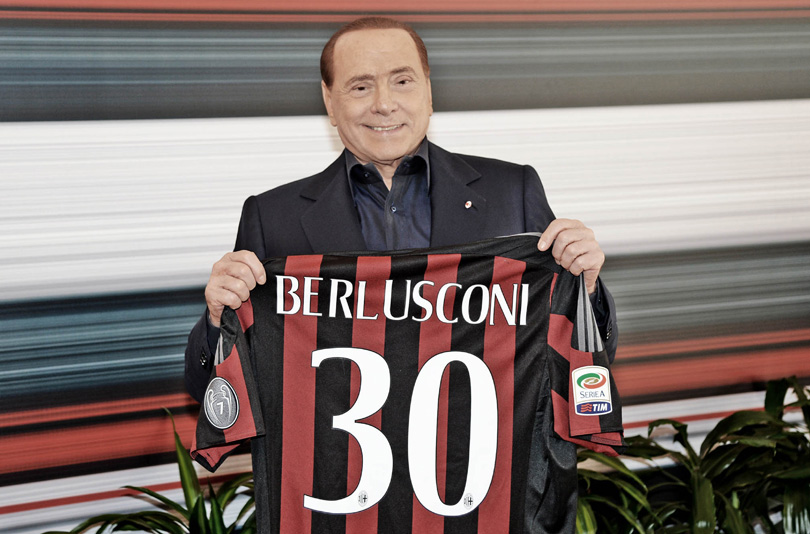
In human terms, the ex-Italian prime minister, bunga bunga veteran and former Milan chairman has [deep breath] been on trial for paying for sex with an underage prostitute, been convicted of tax fraud, been sentenced for accounting fraud and been involved in trials alleging abuse of office, defamation, extortion, perjury, mafia collusion, false accounting, embezzlement, money laundering, witness tampering, corruption and bribery of police officers, judges and politicians.
In football terms, his three-decade chairmanship of Milan turned them into the world’s first modern superclub, built on TV money, on-brand PR and the capacity to go through managers like there’s no tomorrow. In short: a man very much at home at the executive table of modern football.
Words: Alex Hess
26. Dennis Wise
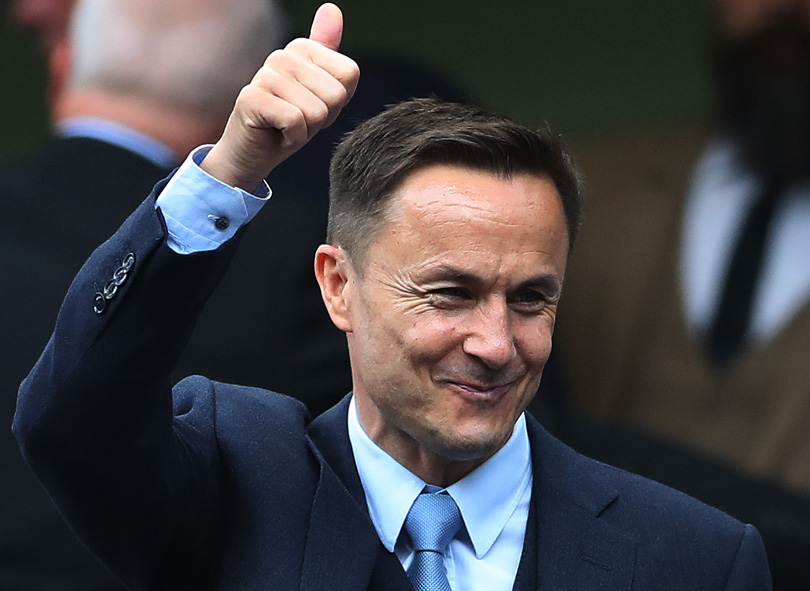
Chelsea’s horrible little Napoleon. Had it not been for inconveniences like his personality and distaste for taxi drivers, the world might remember that Dennis Wise could absolutely play. He was one of the few English players to survive the influx of foreign (better) players at Stamford Bridge and his set-piece delivery was as good as anything in the league during the 1990s.
Alas, that hardly seems the point. To most, he remains the yappy attack dog who would stud an opponent’s ankle before hiding behind one of his centre-halves, and later broke a team-mate's jawbone on a pre-season tour after a game of cards turned sour (then called his sacking by Leicester "a disgrace").
Bonus point: he also managed to be part of Mike Ashley’s loathed “Cockney Mafia” in Newcastle after his retirement as a player.
Words: Seb Stafford-Bloor
25. Roman Abramovich
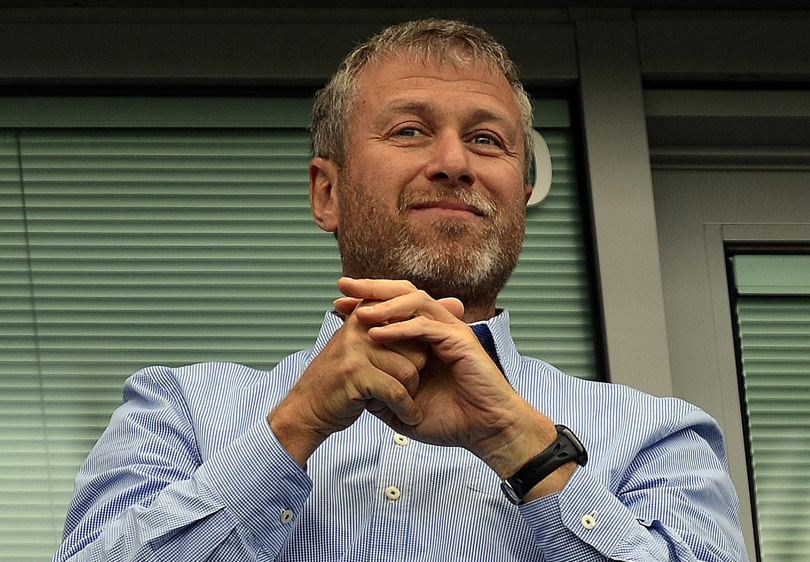
Do you remember the good old days, when the Premier League couldn’t just be bought by the club with the deepest pockets? No, us neither.
But there was a definite step change when Roman Abramovich’s billions swept into Stamford Bridge. Whatever the Russian’s motivations – and you suspect they had more to do with politics than football – his impact on the Premier League has been undeniable.
Chelsea went from also-rans to a trophy-winning machine, and it paved the way for a series of big-money takeovers – most notably at Manchester City.
Abramovich changed English football, but maybe not for the best.
Words: Amit Kawala
24. Kevin Muscat
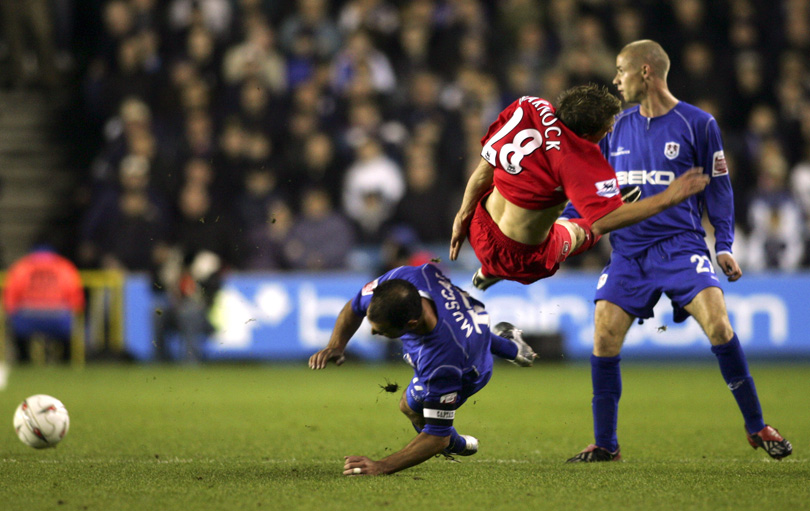
Once voted football’s dirtiest ever player, Kevin Muscat spent a career honing his reputation as a hot-headed endangerment to his peers with a litany of shocking tackles. One, on Charlton’s Matty Holmes, left his opponent unable to play again (Holmes was initially told his leg, broken in four places, may need to be amputated).
One tackle that maimed Christophe Dugarry was branded an “act of brutality” by France manager Roger Lemerre. Another, which injured Craig Bellamy, earned him a revenge-stamp from a former team-mate of Bellamy’s five years later.
His most virally notorious act of savagery, performed during his first A-League match back from a suspension in 2011, was a tackle on the winger Adrian Zahra that got him an eight-match ban. These are merely the lowlights of a bulging portfolio.
Words: Alex Hess
23. Richard Scudamore
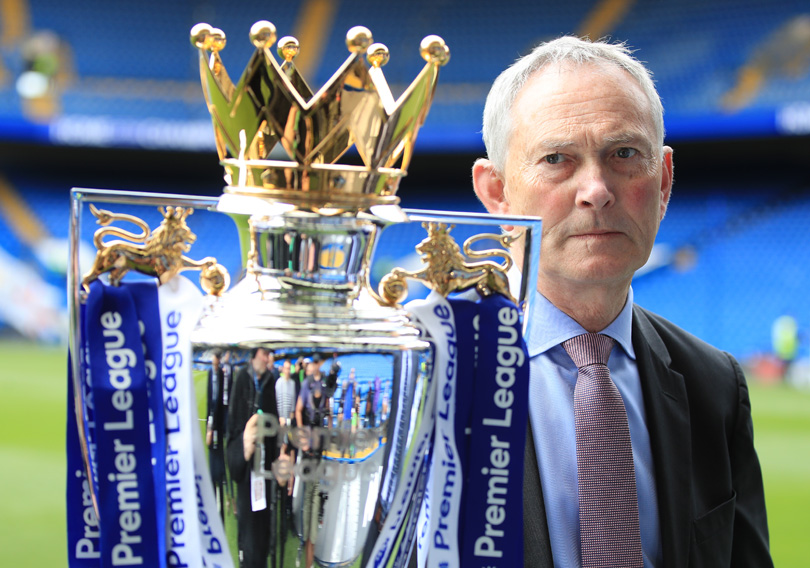
The CEO of the self-styled best league in the world has a broad remit, but he is essentially in charge of the Premier League's commercial operation. Which is to say he's a busy man – and, on the face of it, a very successful one. At least in monetary terms.
The currency he's raked in on behalf of England's top flight – through sponsorship deals, broadcasting rights and various other deal-brokering – hasn't been readily converted into public goodwill, largely because the dollar-signs-in-eyes approach to his job has resulted in such fan-friendly ideas as staging a 39th fixture overseas.
His role as a chief enforcer of regulations around third-party agents' rights, financial fair play and fit-and-proper ownership would also seem to stand in opposition to his interest in filling the division's coffers. If it is a conflict of interests, then, with the Premier League currently standing as the richest league in the world if not the best – you don't have to be Magnum PI to figure out which side Scudamore is broadly percieved to come down on.
Words: Alex Hess
22. Graeme Souness
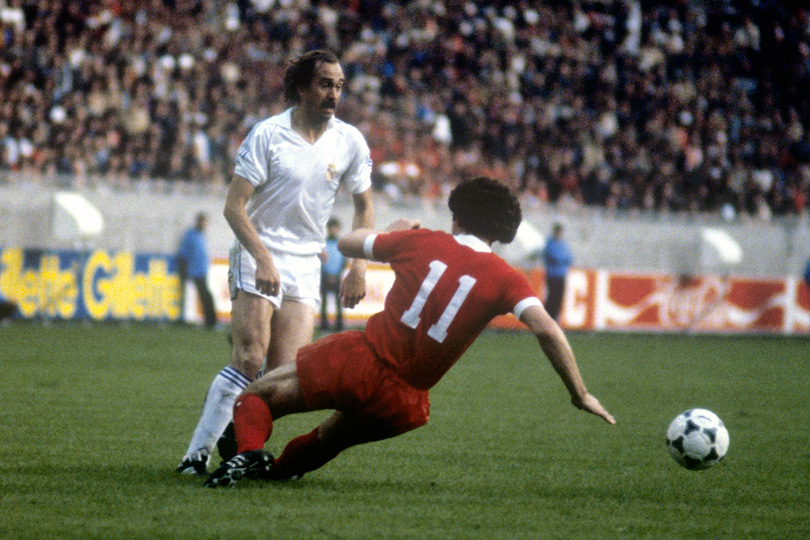
The former Liverpool player has attracted a reasonable amount of ire on these shores, partly for his punditry, but mainly for his performances as a player.
Although he played in an age of combative midfielders, Souness seemed to approach winning the “ball” like a Game of Thrones character going in for the kill: one hefty thwack, and then a pause to wipe the blood out of their facial hair.
The Scot is particularly loathed by fans of Turkish club Fenerbahce, for an incident in 1996 when – as Galatasaray manager – Souness planted his side’s flag in the middle of their rivals pitch. “If he’d done the same thing now, he’d go back to England in a wooden box,” says one fan in a recent documentary.
Words: Amit Kawala
21. Andoni Goikoetxea
“I just felt the impact, heard the sound – like a piece of wood cracking,” recalled Diego Maradona of the moment that earned the Butcher of Bilbao his epithet.
Already renowned for his scandalous tackling having left Barcelona’s Bernd Schuster incapacitated for nine months with shredded knee ligaments the previous season, Athletic Club’s towering centre-half zeroed in on Schusters’ team-mate in 1983 for one of the most notorious tackles in football history.
Maradona ankle was shattered, and legend has it that Goikoetxa still keeps the boot that made the tackle in a glass case in his living room. The following year enmities were renewed in the Spanish Cup final, which climaxed with one of the most staggeringly violent on-pitch brawls ever seen.
Words: Alex Hess
50-41 • 40-31 • 30-21 • 20-11 • 10-1
20. Paolo Di Canio
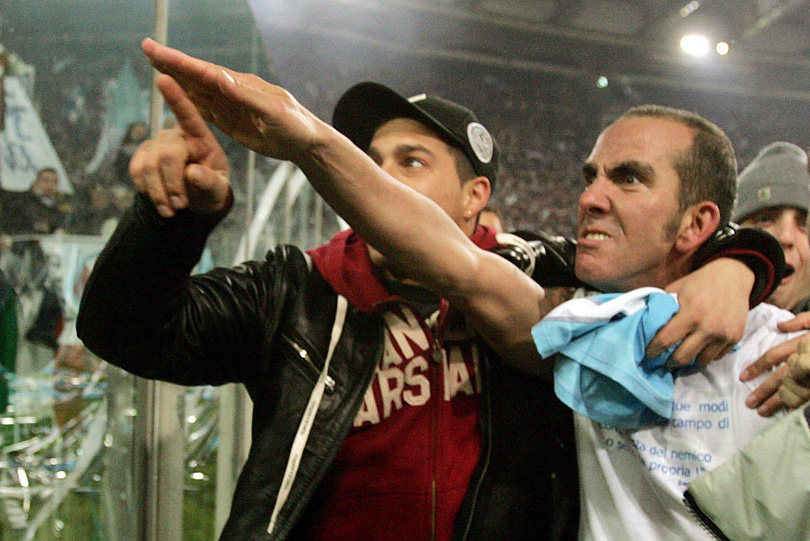
Renowned hot-head Di Canio courted controversy during his playing career, most notably when he shoved referee Paul Alcock into a comical slow-motion fall in 1998. Alcock had just about hit the ground by the time Di Canio’s 11-game ban was served. He carried that emotion into his managerial career with Swindon and Sunderland, but the touchline performance always felt a bit forced.
Yet that’s not the main reason for the hate. Di Canio occupies an uncomfortable position as both a Premier League legend and a fascist sympathiser. He’s got a tattoo of the West Ham crest on his left arm – and did have some incredible moments at Upton Park. But on his right arm are the letters ‘DUX’, an allusion to dictator Benito Mussolini, who Di Canio has previously described as “deeply misunderstood”.
The clincher is probably the tattoo on his back, which features a fascist emblem and a portrait of Mussolini. If only he’d gone for Mark Noble.
Words: Amit Kawala
19. Ashley Cole
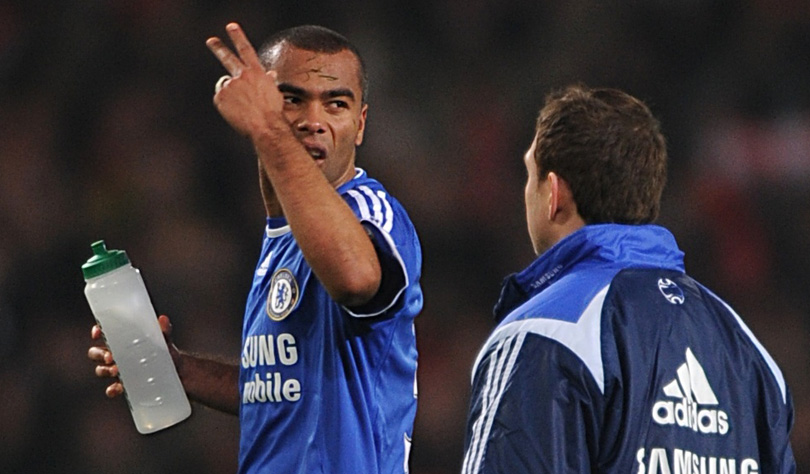
A magnificent left-back who, in shunning a new deal at Arsenal in order to seek employment at the oil-moneyed arrivistes across town, became a symbol of Premier League avarice – even if his medal collection proves there was more to the move than a large pile of roubles.
Either way, Cole was guilty of awful PR if nothing else, his infamous account of the episode in his autobiography betraying a hilarious lack of perspective and creating a money-grabbing persona. This was further honed over the years by a litany of childish skirmishes with referees, journalists and, of course, shooting a work experience student.
Words: Alex Hess
18. Diego Costa
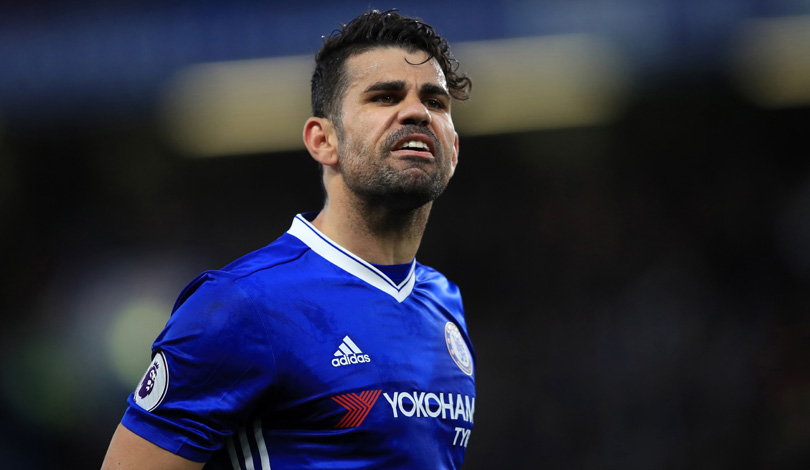
If Jose Mourinho is a manager who draws his motivation from creating conflict, then it's only appropriate that the talismanic player of his second spell at Chelsea was a striker whose autobiography is entitled The Art of War. Plenty of strikers like a personal battle with their marker but Costa made it his life’s work to amass as many blood-spattered battlefield victories as possible.
Enemies accrued during his time in England include Emre Can, Gareth Barry (!), the entire Arsenal defence and, with Shakespearean inevitability, Mourinho himself. You suspect there’s plenty more to come, given that a reunion with Diego Simeone awaits.
Words: Alex Hess
17. Mike Ashley
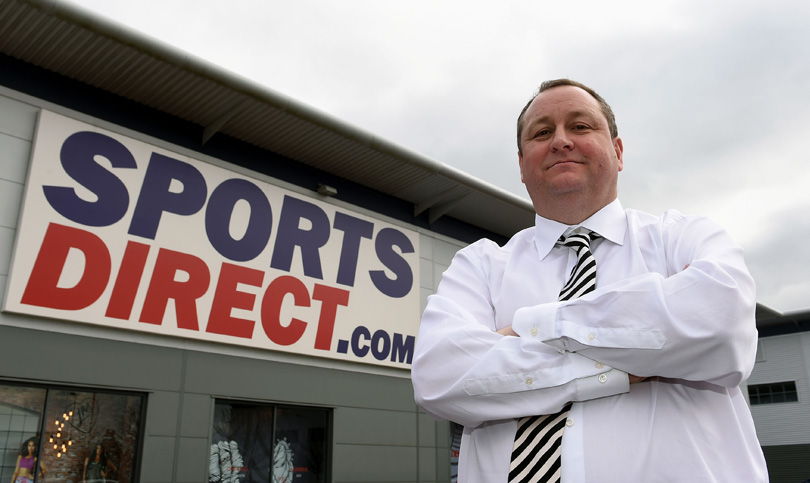
Among other, lawyer-teasing descriptions, Ashley is the archetypal football owner to be feared. Fan bases can be intimidating, particularly when they don’t get their own way or believe that their club is being mined for used for clandestine purposes. Ashley didn’t care.
Newcastle’s owner for more than a decade now has seen protestations over the SportsDirect.com hoardings, the renaming of St James’ Park and the many dreadful transfer and recruitment decisions, and waved them all off with a dismissive smirk.
A man so brazenly uninterested in tradition that it’s almost admirable. Unless he owns your football club.
Words: Seb Stafford-Bloor
16. Luis Suarez
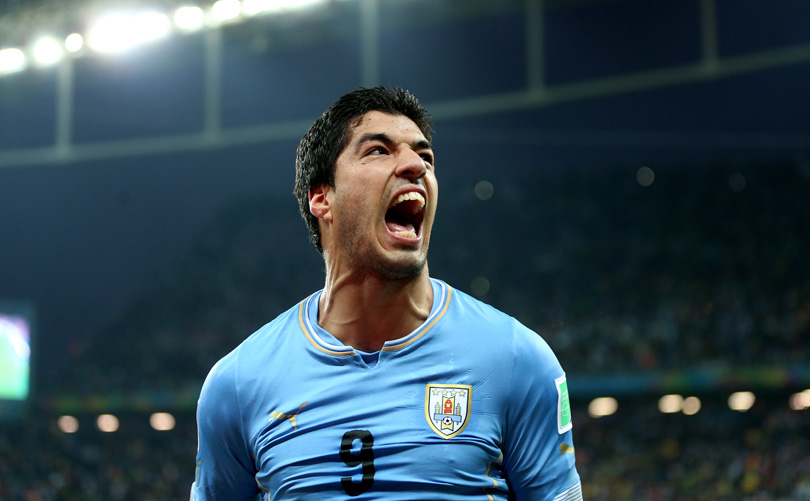
Unless you played unhealthy amounts of Football Manager in the mid-2000s or regularly watch the Eredivisie (which, let’s be honest, you don’t), your introduction to pantomime villain Luis Suarez was probably the 2010 World Cup and that deliberate handball on the line against Ghana.
Asamoah Gyan smashed his penalty against the bar, Suarez celebrated like a man who’d just been pardoned from death row, and then a year later he pitched up at Liverpool. Here are a selection of the sub-headings from Suarez’s Wikipedia entry:
- First biting incident
- Racial abuse incident
- Second biting incident
- 2013/14 season, Player of the Year
- 2014 FIFA World Cup, third biting incident
And that, in a nutshell, is the issue. Suarez is so, so good – among a handful of truly world-class strikers, but he draws scorn because he can’t seem to control his behavior at times, and because of the dastardly streak that colours his every move.
Words: Amit Kawala
15. Ken Bates
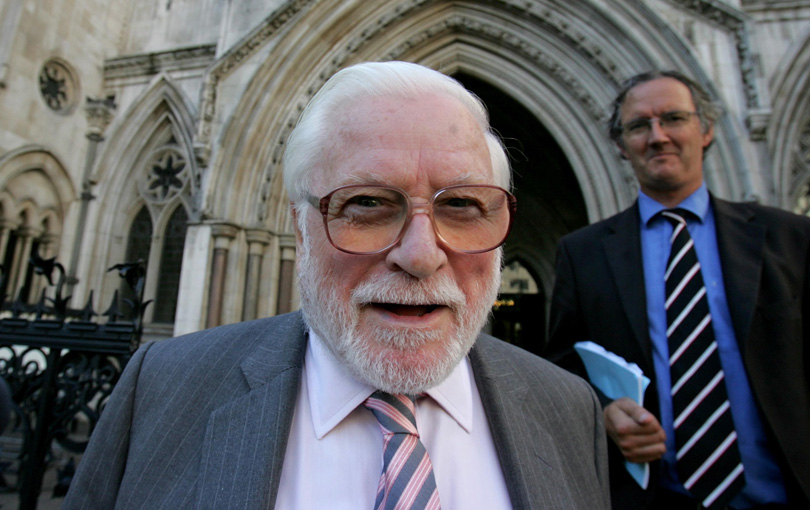
Having spent an entire £1 to recover Chelsea from football’s bargain bin in 1982, much of Bates’s following two decades at the helm were then spent offending and estranging the club’s fans. His first big idea was to frighten off potential pitch invaders by building an electrified fence around the field – a ruse that, having already been built, was outlawed by the FA.
Other highlights include describing a supporters’ club as “parasites” and the then-recently deceased club legend Matthew Harding as “evil”.
Originally a property tycoon, his business dalliances were of the west London-via-Geneva variety, and after an eight-year stint at Leeds – where, as at Chelsea, the content of his programme notes meant he ended up in court – he now lives in Monaco, occasionally providing “colourful” interviews that paint him as a quirky eccentric. But as a great man once said: “Just because you are a character doesn’t mean you have character.”
Words: Alex Hess
14. Joey Barton
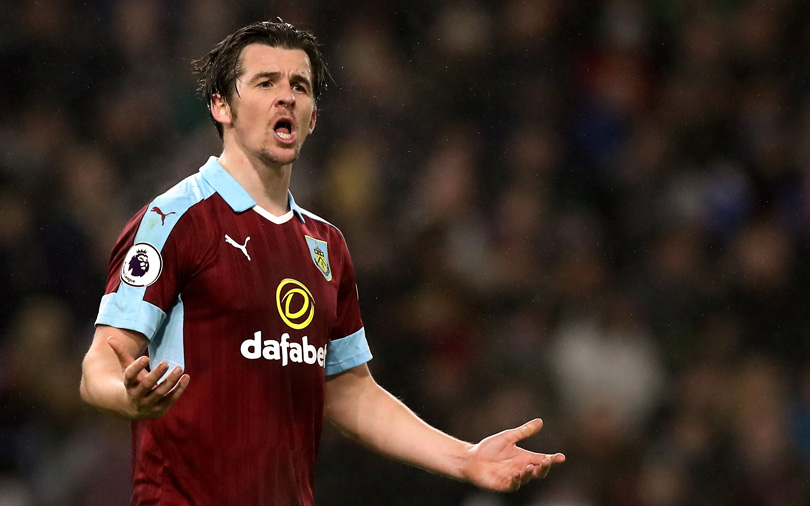
If Barton had half the rap sheet he’s accrued, he’d still be here. As it is, his stubbing out a cigar in a youth player’s eye, beating up then-team-mate Ousmane Dabo, being jailed for assault and affray, sucker-punching Morten Gamst Pedersen, plus being banned from football for gambling on matches, stand out among his more humdrum efforts like red cards or barbed outbursts.
The Jekyll and Hyde-ish Barton is also articulate and can be very charming. Yet even in his excellent autobiography, written with Michael Calvin, a whiff of ‘I make no excuses for this episode, but... [list of excuses]’ pervades. It’s easy to understand why he’s disliked.
Words: Alex Reid
13. Diego Maradona
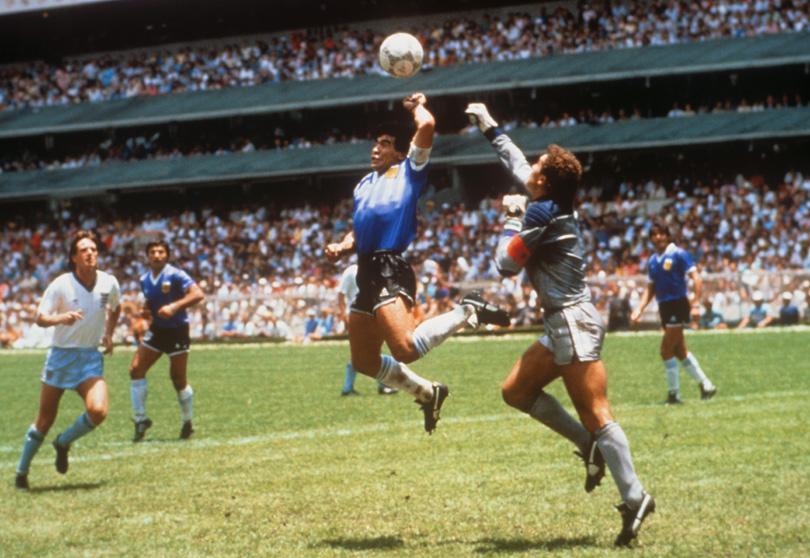
Even those who can't stand to look at the stumpy Argentine will appreciate just why Diego Maradona, a joyous attacker who carried multiple underdogs to glory, is also one of the best-loved players of all time.
Yet they have good reason to grit their teeth when they hear his name, too: his foremost crime to British audiences was haymakering the ball past Peter Shilton in 1986 (and then, by his own admission, urging his team-mates to throw the ref off the scent by celebrating as though nothing had happened).
However, other offences include a couple of failed drugs tests, some wild-eyed on-pitch violence and booting a fan while coaching in the UAE. It's the media, though, who have bore the brunt of Maradona's wrath: journalists have been variously run over, sworn at, insulted, invited to engage in intimate acts and even shot by the great man. No wonder he divides opinion like few others in the game.
Words: Alex Hess
12. Karl Oyston
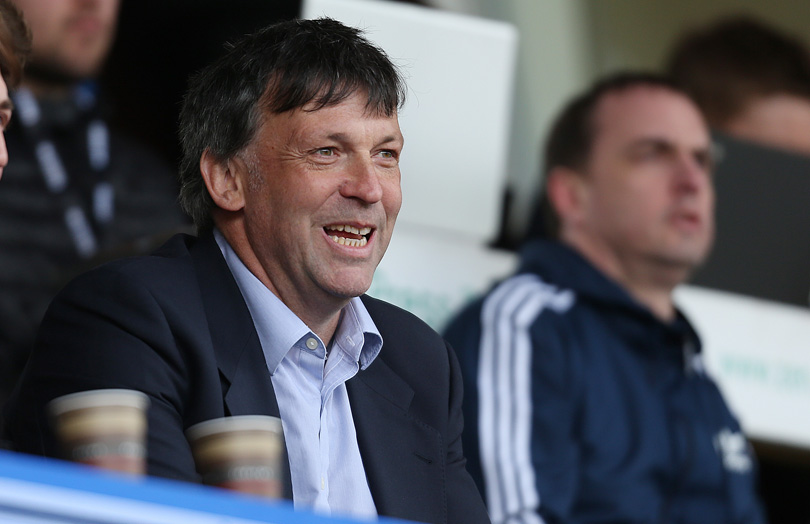
The curse of the horror owner somehow seems much worse when it’s a local boy doing the damage. The Oyston family made their money in property and telecoms, and bought shares in struggling Blackpool in the 1980s. By 1999, Karl was in charge – after father Owen was imprisoned for rape, and mother Vicki resigned.
There was a season in the Premier League to enjoy, but since then, fans’ feelings have turned due to a lack of investment and an attitude to supporters that ranged from indifference to outright malice. There were massive protests even before the extent of Oyston’s mismanagement had come to light.
In November 2017, it was revealed that Karl and Owen Oyston had been asset-stripping the club by paying out millions to their own companies. They’ve now put the club up for sale, so perhaps the nightmare is finally almost over.
Words: Amit Kawala
11. Bernard Tapie
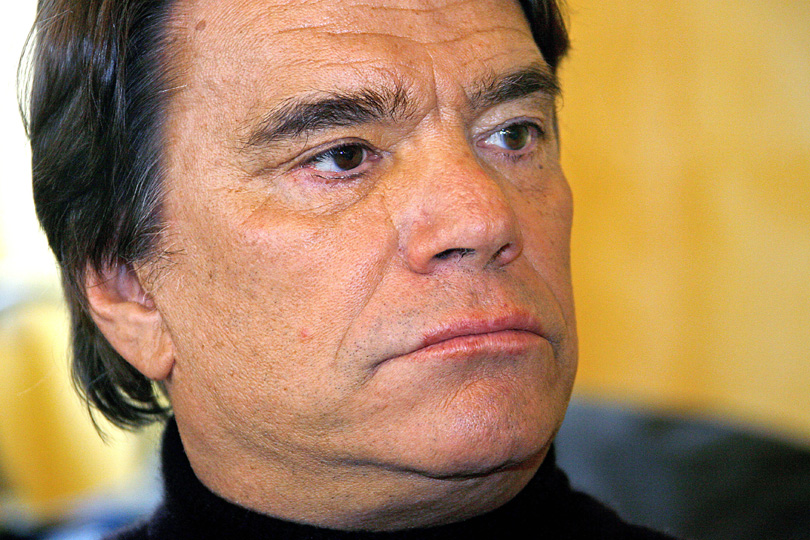
Let’s tread carefully with this one. In 1993, the fabulously talented Marseille team that won the Champions League were stripped of their Ligue 1 championship after their president Tapie was found to have fixed a domestic match. The motivation appeared to be giving Marseille’s players an easy night ahead of their European final. Later, financial irregularities for which he was also deemed responsible saw the club relegated to Ligue 2.
Tapie – someone who could euphemistically be described as colourful – has made all sorts of enemies in all manner of industries and places. His running of the La Vie Claire cycling team was as controversial as you might expect and resulted in one of the most fractious Tours de France in memory. Over the past 25 years he has managed to be declared bankrupt, been banned from football (obviously) and prohibited from running for public office, while also squeezing in a prison sentence.
Not bad for someone who started life as a lounge singer. Yet that tainted Champions League triumph is his lasting legacy within the game.
Words: Seb Stafford-Bloor
50-41 • 40-31 • 30-21 • 20-11 • 10-1
10. John Terry
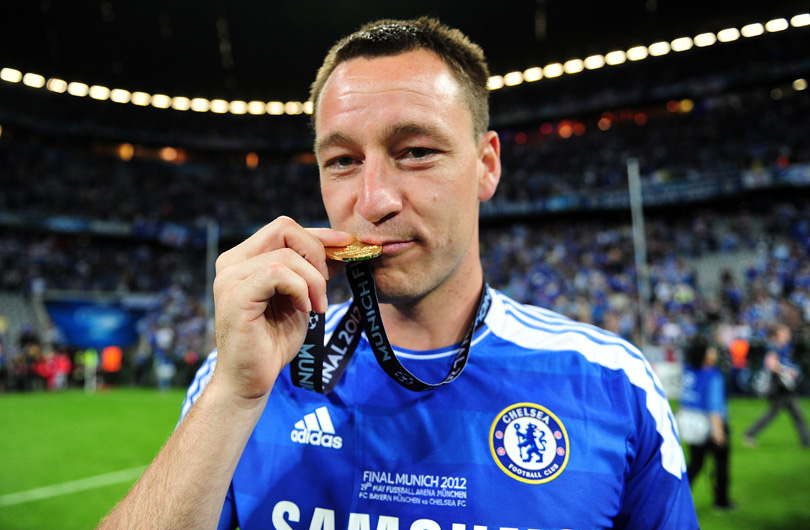
On the pitch, the former England captain is the kind of player every fan would love to have in their side: an exceptional, brave and bold defender, willing to stick his head in where it could hurt to an almost ridiculous degree.
Chelsea fans love him because he is the living embodiment of their club. That could be why everyone else absolutely despises him, and why ‘the slip’ in 2008 provoked such glee. There have been fights with bouncers, affairs with team-mates’ ex-girlfriends, and the abuse of Anton Ferdinand which cost Terry the England captain’s armband. On top of that, there’s the slightly nauseating stuff – changing into full kit to participate in the trophy ceremony when he missed the Champions League final through suspension, or the 26th-minute guard of honour he got in his last Chelsea game.
No matter what good he does – and Terry is reportedly quite the philanthropist – in the eyes of many football fans, he will be remembered as the kind of man who would park his Range Rover in a disabled bay to go and pick up a kebab.
Words: Amit Kawala
9. Pete Winkelman
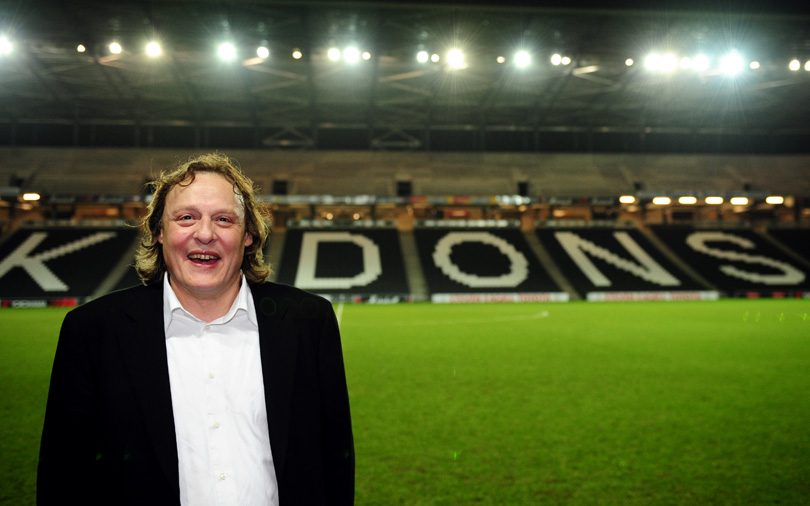
Winkelman's occupation, as per Wikipedia, lets you know what you’re in for. ‘Property developer, football chairman,’ it reads – and at a time when both of those job titles tend not to engender much public sympathy, Winkelman's reputation is that of a man who embodies the worst of both worlds.
He is, of course, the man who engineered Wimbledon's move to Milton Keynes (and subsequent name-change to MK Dons). While it can easily be argued that much good came from that in the form of a triumphant AFC Wimbledon, that doesn't render Winkelman's role in the shameful saga of a new club essentially buying a place in the Football League any less, well... shameful.
Words: Alex Hess
8. El Hadji Diouf
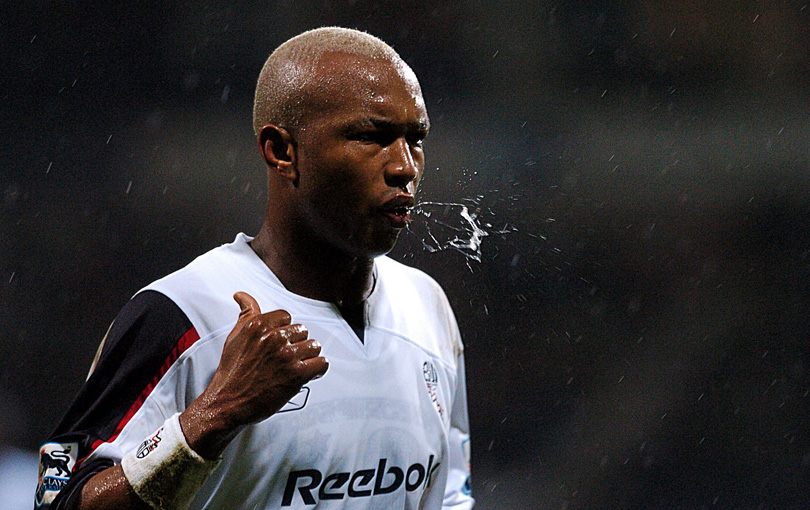
Trying thinking about Diouf without breaking into a smile. Try it.
It’s not a benevolent smile, of course, more of a weary, roll-of-the-eyes type of expression. He dived, he spat at opponents and he seemed to adore being hated. According to Jamie Mackie, he was also partial to the taunting of seriously injured players.
He hasn’t mellowed in retirement, either, and seems terribly fond of re-writing his own Liverpool history. Steven Gerrard and Jamie Carragher in particular continue to attract his ire which, given their relationship and service at Anfield, neatly surmises the quality of his judgement.
And you know what’s interesting about those barbs? Nobody ever bothers to return fire. Less a footballer, more of a cartoon villain.
Words: Seb Stafford-Bloor
7. Luciano Moggi
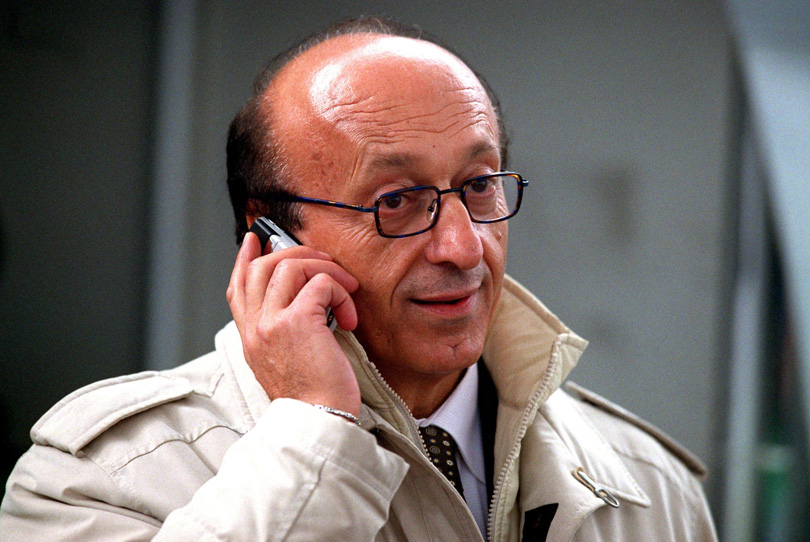
In the 2004/05 Serie A season, Juventus had Gianluigi Buffon, Zlatan Ibrahimovic, Alessandro Del Piero and absolutely no need to cheat. But that’s exactly what their general manager Luciano Moggi did, repeatedly, when he sought to influence the selection of referees for Juventus matches – part of the infamous Calciopoli scandal.
Moggi had previous. He’d also been implicated in an attempt to manipulate the transfer market and has previously spoken out against gay footballers.
His actions saw the Old Lady booted down to Serie B, and he was banned from football for life – although that doesn’t stop him commenting on it in a newspaper column.
Words: Amit Kawala
6. Cristiano Ronaldo
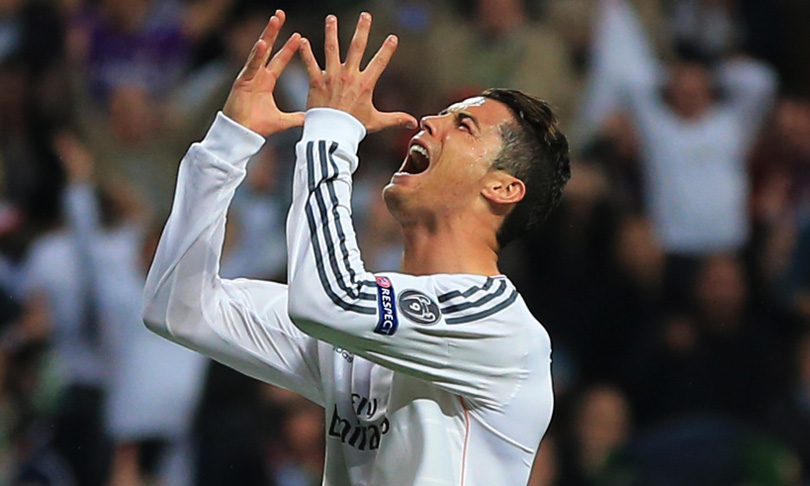
If the defining battle of Ronaldo’s career has been against Lionel Messi, the other has been against public perception. Put simply, lots of people – be it opposition fans, neutrals and even on occasion his own supporters – haven’t taken to a man who even Sepp Blatter once derided as self-absorbed.
The windows into the less endearing facets of character are neither subtle nor infrequent, be it his pre-rehearsed muscle-man pose after scoring the fourth in a 4-1 Champions League final win he had barely contributed to, or pausing mid-celebration at last year’s Euros to check himself out on the stadium’s big screen.
While few are under any illusions as to his greatness, plenty are put off by his ludicrous narcissism. Of course, he wouldn’t have one without the other, and while his ego is clearly a product of his brilliance, you sense it works the other way too: the unrelenting dedication that has earned Ronaldo his all-timer status is something only a deeply self-obsessed man could be capable of. But that doesn’t make it any less off-putting. A sublime footballer as hard to love as he is easy to admire.
Words: Alex Hess
5. Richard Keys
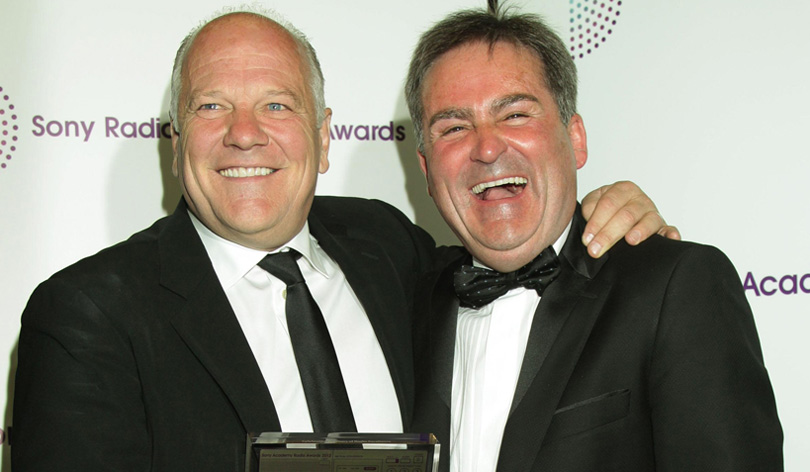
Sadly, Richard Keys has been updated more recently than his views on women, so visitors are no longer greeted with 1990s stylings and the slogan ‘Your [key symbol] to sports’ above his self-serving hogwash.
The life of the disgraced former Sky Sports presenter is a daily battle to stay relevant, and Keys refuses to show any sort of contrition for the comments which saw him and his partner-in-bantz Andy Gray removed from their positions at the broadcaster.
After a stint at TalkSport they’ve pitched up in Qatar, where their role seems to be beating the drum for the least appropriate World Cup host in history; a kind of Lord Haw Haw for the horrifying future of football.
Keys had it all – a respected position, a fat salary, a dream job. Did he smash it? Not so much.
Words: Amit Kawala
4. Michel Platini
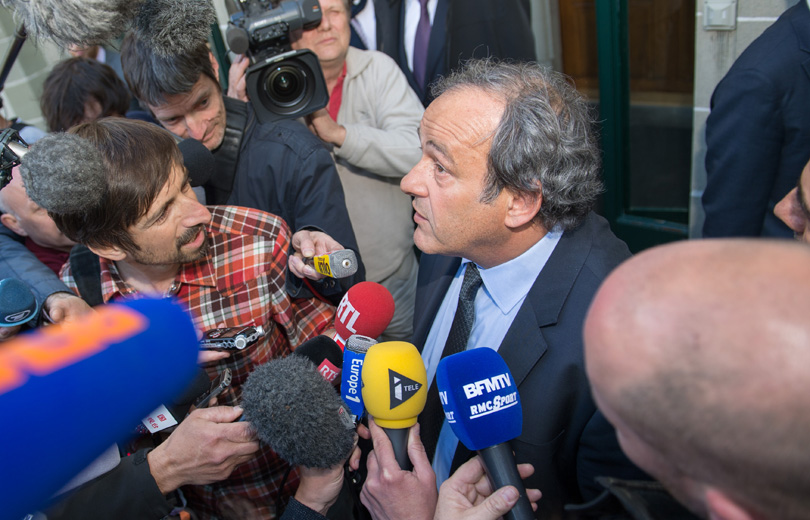
Given what Platini was as a player, the epilogue to his football life is tremendously sad. From being the arguably the best footballer in the world for a period in the 1980s, to a regretful exile in the modern day.
As FIFA began to crumble, Platini seemed like a ray of light and the exception to the rule about football’s legislators. Alas not: a murky payment was found, a watch was not handed back, and this champion of Qatar 2022 became another one of them – for whom the sport’s community continues to have utter disdain.
Words: Seb Stafford-Bloor
3. Harald Schumacher
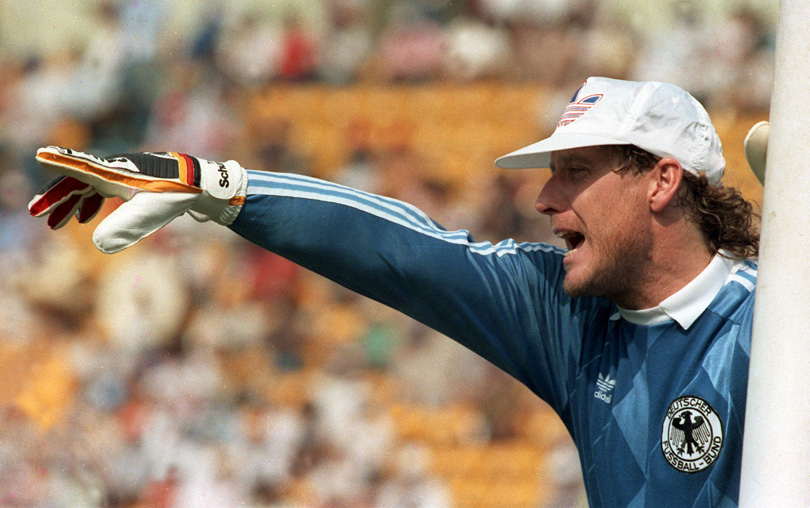
German goalkeeper Schumacher once finished above Adolf Hitler in a newspaper poll of France’s most despised people. The hatred stems from an infamous tackle at the 1982 World Cup, when Schumacher clattered the onrushing French player Patrick Battiston, making absolutely no attempt to play ball and smashing him across the face with his forearm.
Battiston was knocked unconscious and suffered damage vertebrae, as well as losing three teeth. He later slipped into a coma. The referee awarded a goal-kick.
“If that's all that's wrong with him, I'll pay for the crowns,” said Schumacher, when hearing his opponent had lost teeth in the post-match press conference.
Words: Amit Kawala
2. Jose Mourinho
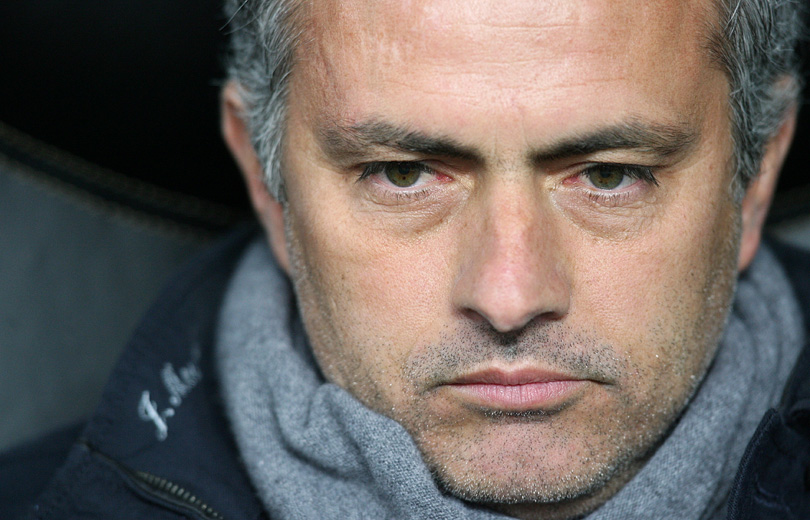
Most people tend to avoid conflict. Some don’t mind it. A tiny few openly embrace it. And then there are those who cannot contemplate life without it; who draw energy, motivation and perverse joy from locking horns with people who despise their very existence.
A strange way to live, perhaps, but in Jose Mourinho’s case it has served him well, as his status as one of the game’s greatest ever coaches would attest. The legendary Broadway producer David Merrick once said: “It is not enough for me to win – my enemies must lose.”
Mourinho operates along similar lines, creating new enemies for himself at each corner, be it Arsene Wenger, Eden Hazard, Pep Guardiola or the entire populations of Merseyside, Catalonia and half of Madrid.
His position as elite football’s pantomime villain, first hinted at with his celebratory sprint down the Old Trafford touchline in 2004, was given a more sour edge two years ago when his treatment of Eva Carneiro crossed the line between siege mentality theatrics and indefensible bullying. It won him few friends. Not that he’ll mind.
Words: Alex Hess
1. Sepp Blatter
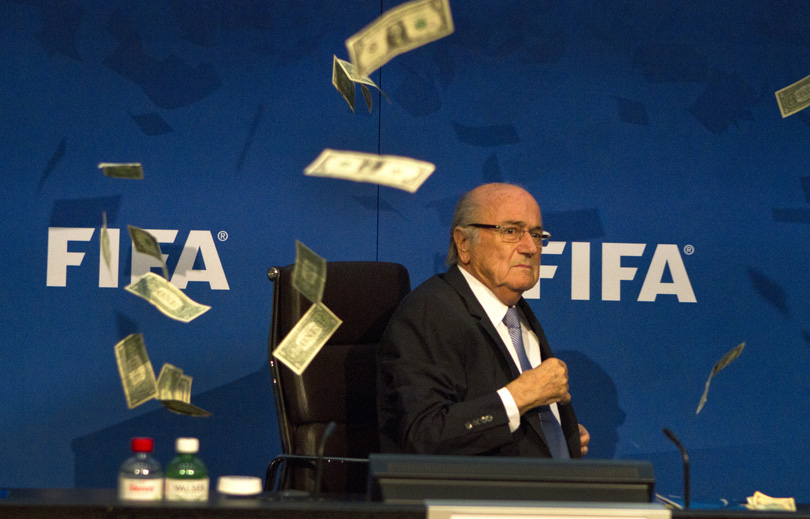
In a speech to students at the Oxford Union in 2013, then-FIFA president Sepp Blatter argued that his time in charge of the global game had been misinterpreted. “You may think you know what FIFA is, what it does... A faceless machine, printing money at the expense of the beautiful game with me pulling the strings and laughing all the way to the bank. It’s not exactly that.”
Except it was, as it turned out. It took decades, but the web of greed and corruption of the company that Blatter sat at the head of eventually unraveled in spectacular style – and took down much of football’s governing structure with it.
Blatter is actually quite well thought of outside of Europe and the Americas, but the way he prioritised profits over fans tarnished the World Cup and the game itself in a way that could take a long time to fix.
Words: Amit Kawala
Now read...
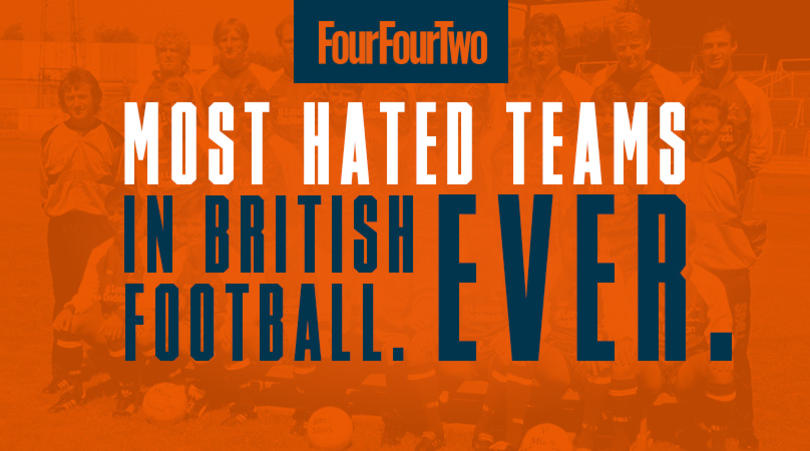
Alex Reid is a freelance journalist and the former digital features editor at FourFourTwo. He has also written for the Guardian, talkSPORT, Boxing News and Sport magazine. Like most Londoners, he is a lifelong supporter of Aberdeen FC. He is deceptively bad in the air for a big man. He has never been a cage fighter.

